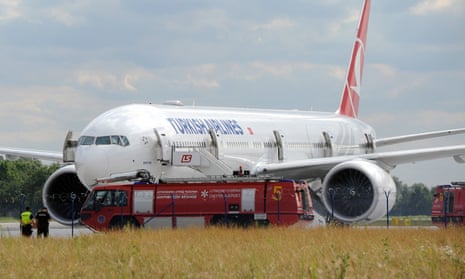Mehmet Altug Ekis, the captain on board the Turkish Airlines flight TK79, was doing his best to sound calm.
“Everything is normal,” he told the cabin on the intercom. “We are in Polish airspace and are going to make an emergency landing. In these circumstances, military jets accompany planes. If you see some military jets, please, it is normal too.”
But everything on the Turkish Airlines flight TK79 was far from normal as the Boeing 777-300, en route from Istanbul to San Francisco, was forced to go into crisis mode barely two hours after takeoff on Thursday.
The discovery of a suspected bomb – in the form of an unclaimed mobile phone, found on a passenger seat in the rear end of the plane – had thrown cabin crew into panic. The baby three seats in front of me began to scream, his mother began to cry. As we started to descend at a pace not normally associated with normal flight, Ekis did what his emergency manual dictates: he dumped fuel.
For what seemed like an age, passengers in window seats became fixated as a furious grey-white jet stream of fuel was released into the skies. In seat 11A, Suma, a young Turkish woman living in Los Angeles, immediately thought of Turkey’s newfound resolve to fight Islamic State. “God, this is it,” she said. “This is payback. Get that phone off this plane.”
For almost one hour, cabin crew attendant Gökhan Ataç and his colleagues debated what to do.
Three years into the job, Ataç was also thinking the worst. This was his third diversion – “we don’t like to say emergency landing” – but it was by far the most alarming. Turkish security had searched the aircraft beforehand and missed the phone. How could it have got there? Was it a bomber’s detonator? Was it connected to an explosive on board? Was it some sort of reprisal for Turkey’s move to hand over Incirlik airbase as a launching pad for strikes against Isis?
All these questions had rushed through his mind. The 777 had previously flown in from Mumbai. Could it have been left then?
None of the economy class passengers had responded to an announcement to claim the device. The crew would have to follow cabin crew rules.
“We took the phone, placed it outside door five at the farthest right-hand corner of the plane, put it on top of a piece of luggage and then put another piece of luggage on top of that and covered both with a blanket,” said Ataç. “That is exactly what the security manual says.”
And then Ataç and all 332 people on board waited as Polish authorities decided to scramble jets and Ekis made the executive decision to land.
As the woods of Poland and the triangular roofed cottages that dot its fields came into site, the relief was almost palpable. But so was the silence. In times of crisis people cry but they also remain calm and on flight TK79 it was a prevailing sense of calmness – of not being able to change fate – that shone through. In Warsaw we touched down to firefighters and a hundred police and elite shaven-haired troops dressed in black. For a long time the phone remained on the plane as the firefighters, police and elite troops looked on.
“It was crazy. They wouldn’t let us open the door to give it to them,” said Ataç. “They insisted on accessing the aircraft with a set of stairs which must have taken at least 15 minutes.”
Sometime after the plane was evacuated the phone was removed. As passengers were treated to coffee and chocolates in the Frederick Chopin VIP lounge, the elite security forces destroyed it. No explosive device was found on board. The unclaimed phone had spurred the Polish government to scramble jets, had forced thousands of tons of fuel to be dumped over the Polish countryside and had triggered an emergency landing. In the end it was probably an innocent who left the device on board.
When flight TK79 continued its journey, nothing was the same again. In-flight dining had been dramatically scaled back and in-flight internet was no more.
But there was a lightness that previously had not existed. And as we flew west, out towards the sea, the phone that had been the cause of so much trouble was also the spur for silent beatitude and a renewed love of life.
